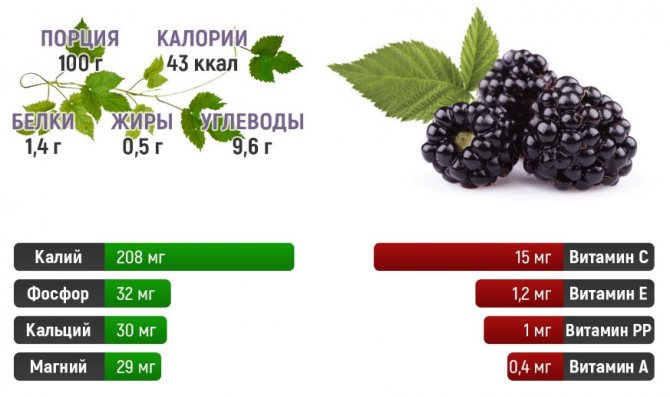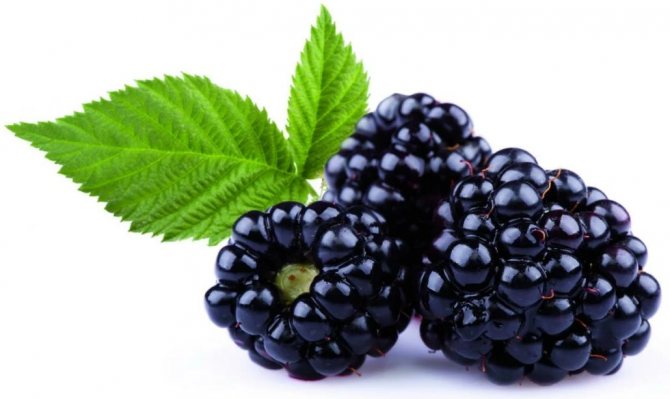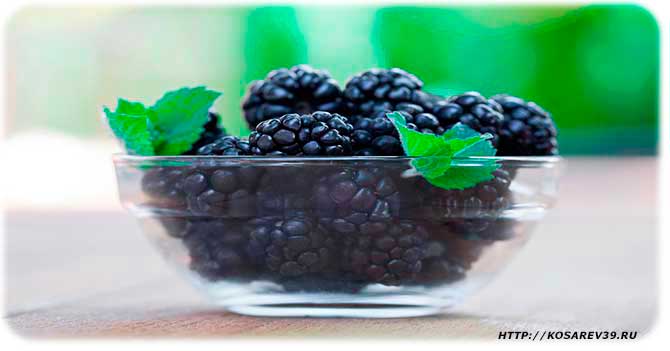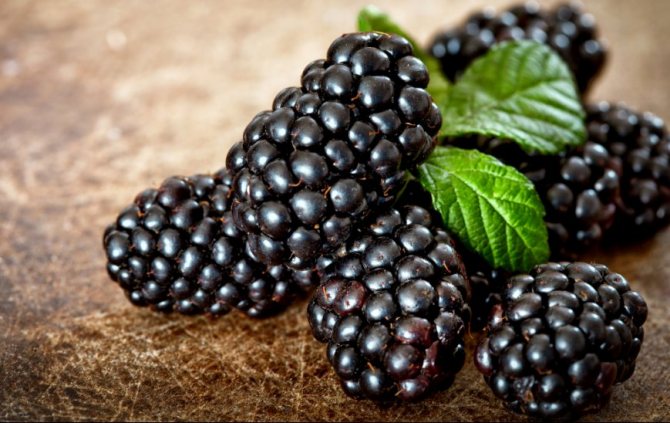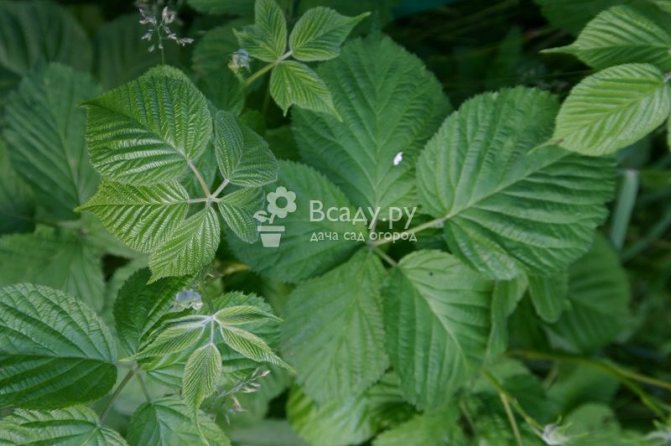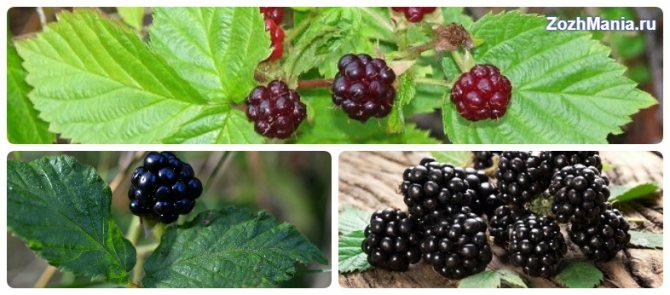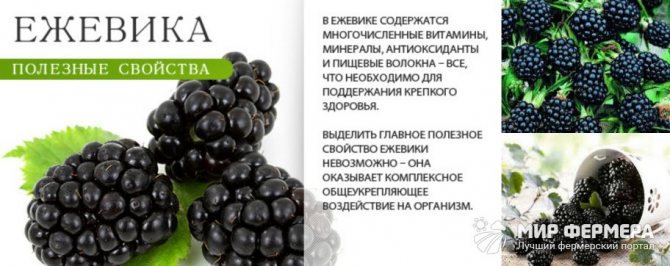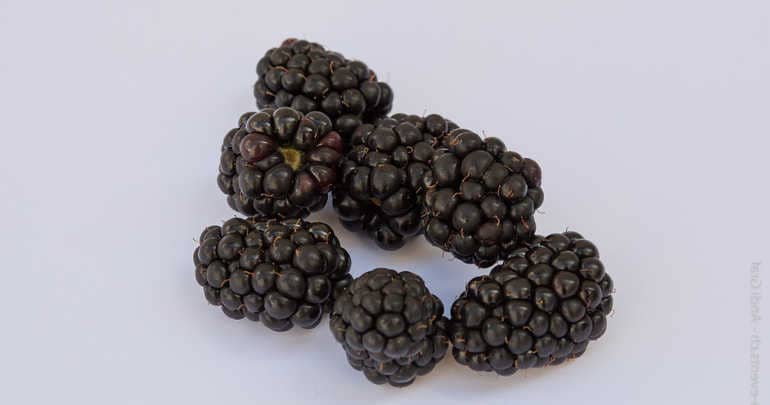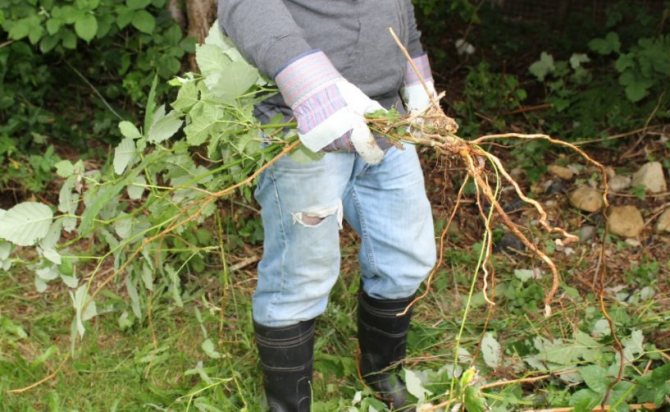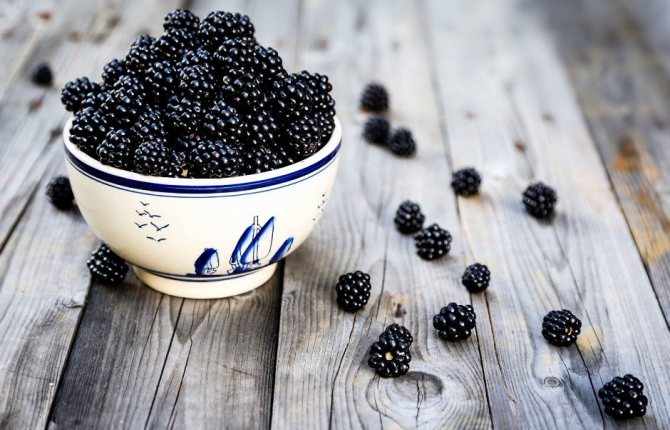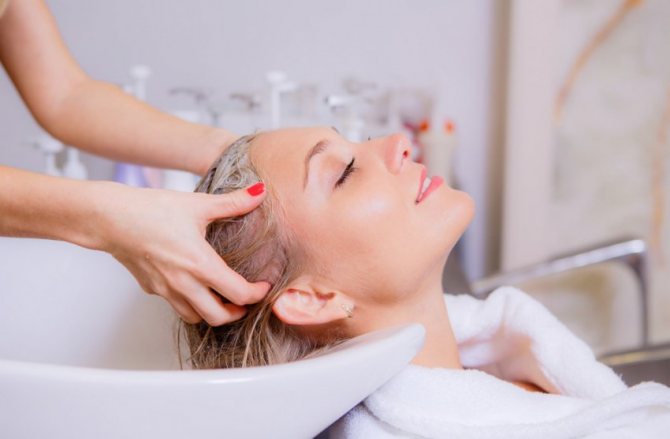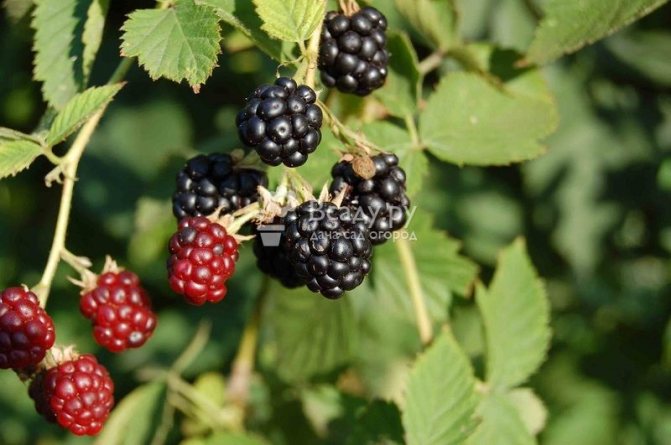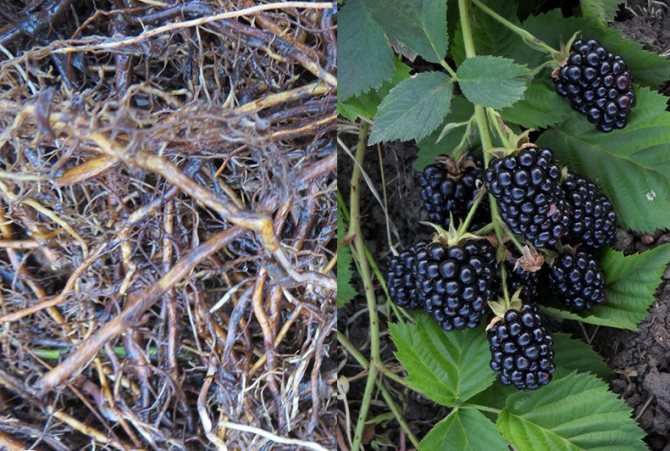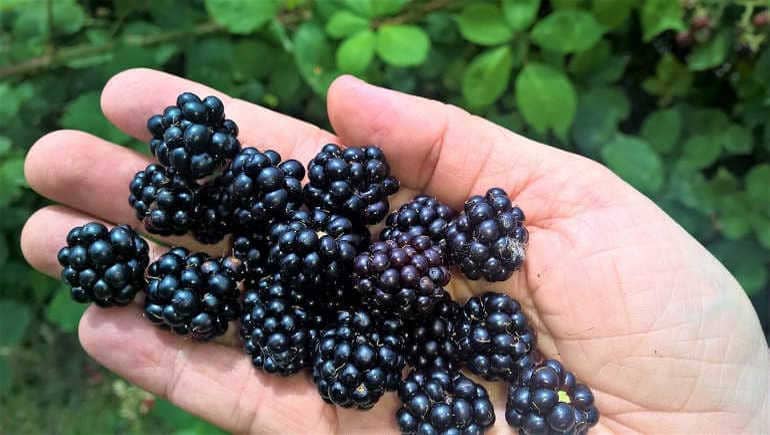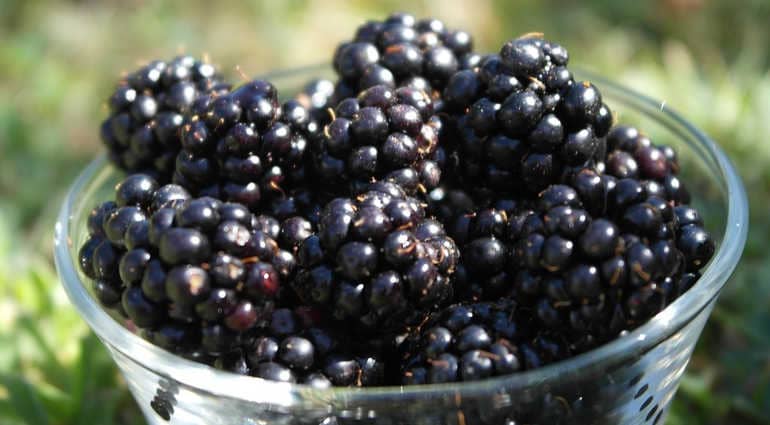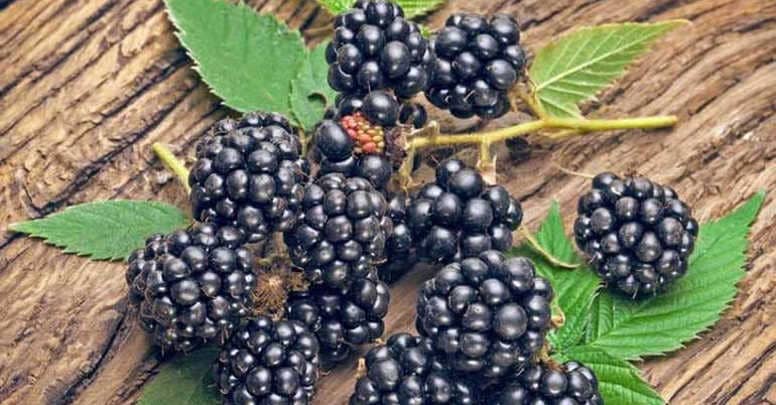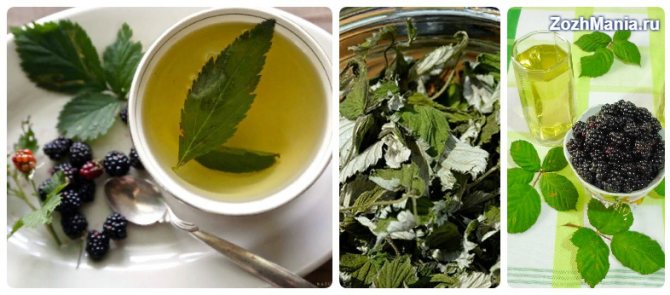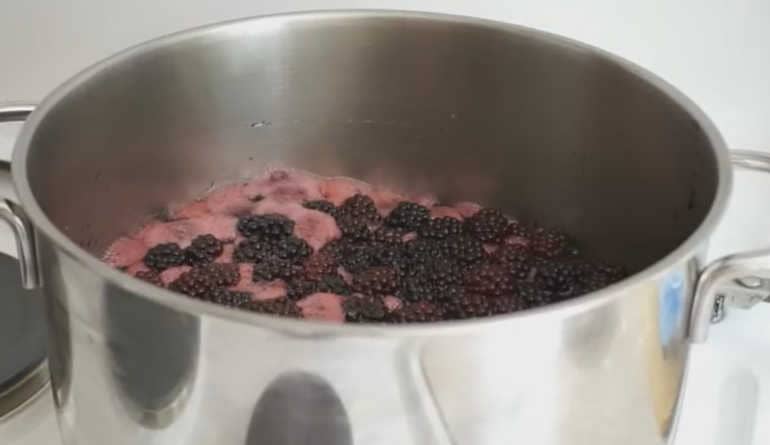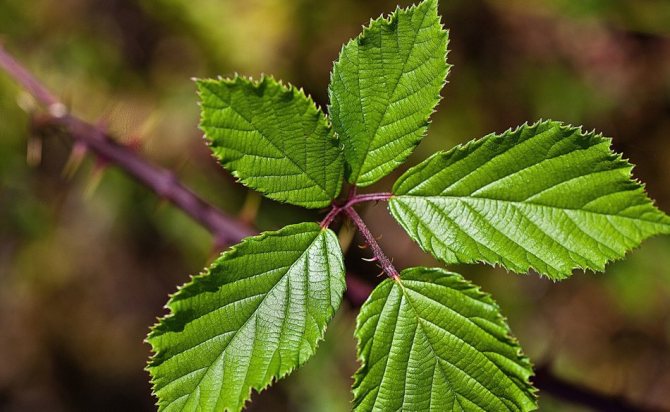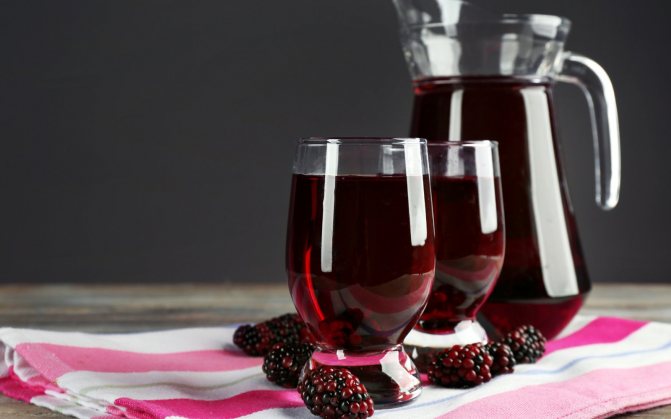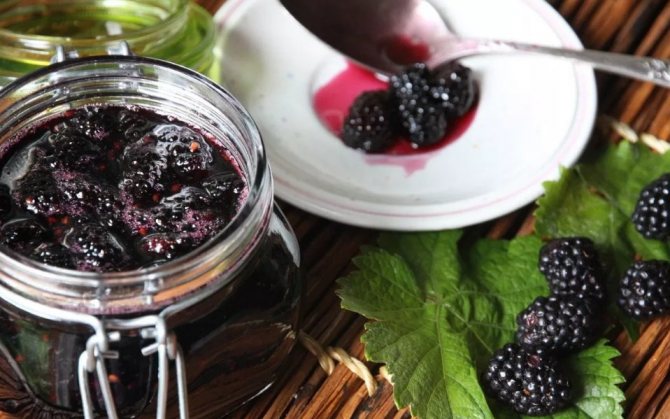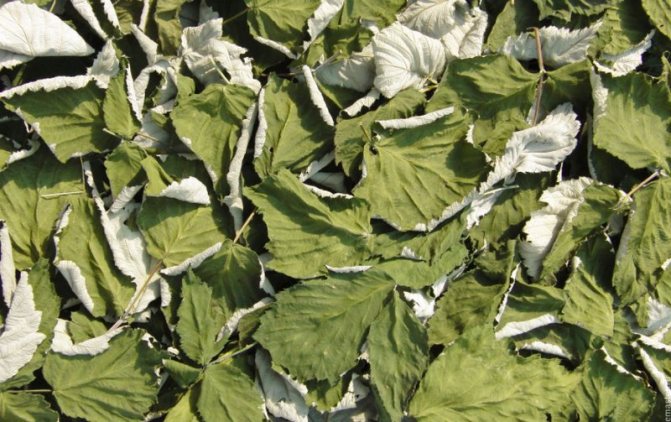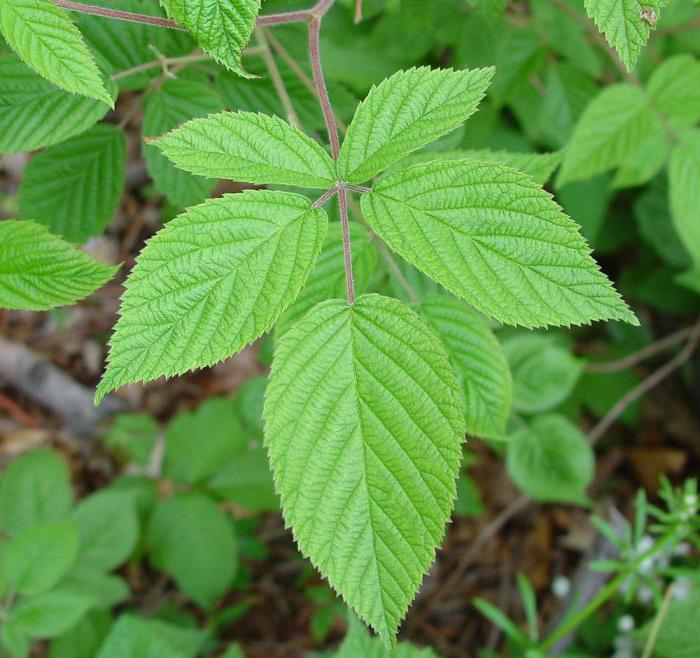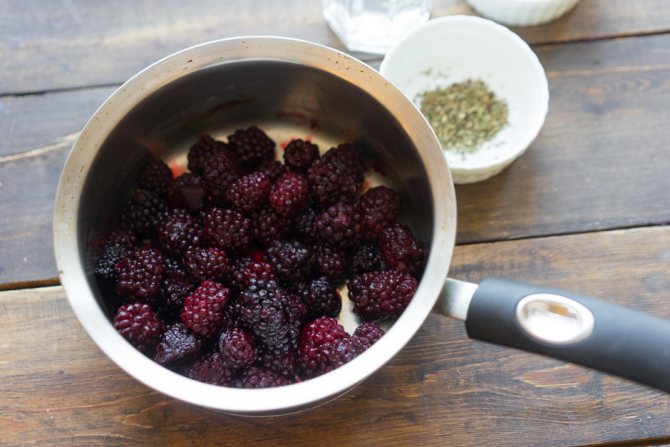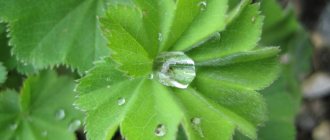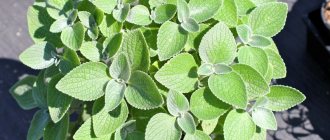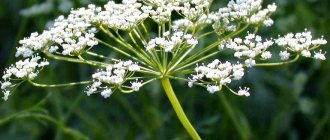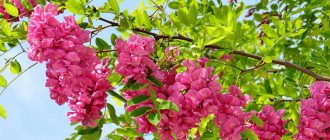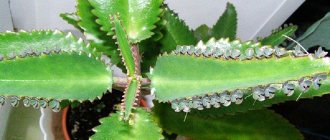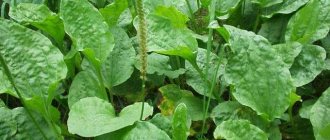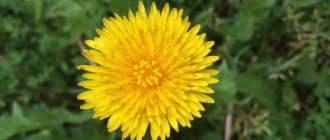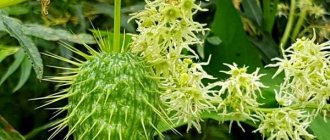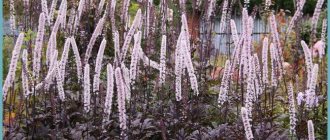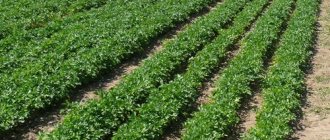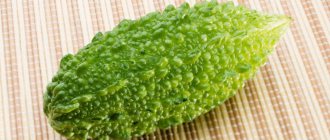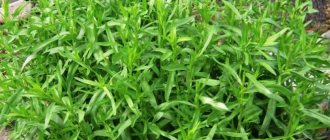19032
Large, tart, almost black, blackberries offer incredible value. Fruits are not inferior in benefits to garden raspberries, and in some ways surpass them. Many people love blackberries, their health benefits and harms are inseparable, so you should not abuse the gifts of nature. With proper use, with the help of a blackberry harvest, you can improve metabolic processes, strengthen immunity, increase hemoglobin levels, and take care of the prevention of many diseases.
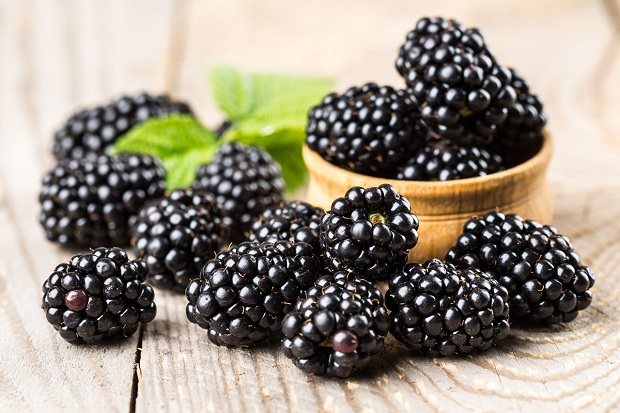
Benefits in every berry
Calorie content and chemical composition of blackberries
It is difficult to list the entire composition of the nutrients of the berry within the framework of one article, but the berry is especially appreciated for its large amount vitamins P, C, A, B, bioflavonoids, tannins, iron, organic acids: malic, nicotinic, citric and others.
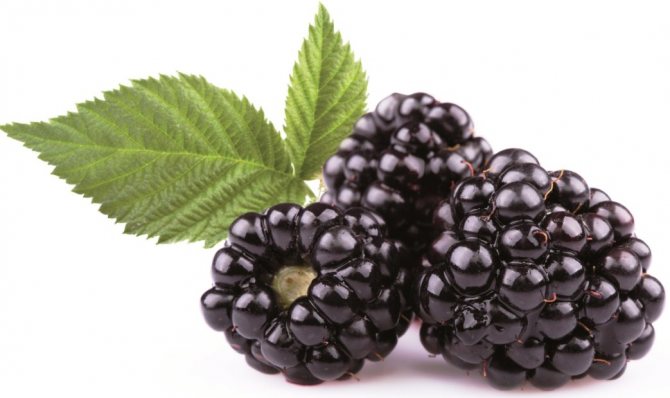

Due to its low calorie content (100 g of the product contains 34 kcal), blackberries are considered a dietary berry. It contains 4.4 g carbohydrates, 0.5 g fat and 1.5 g protein
.
As for the other composition of the berry, the following substances were found in it: ash, mono- and disaccharides, water, organic acids, dietary fiber, vitamins (PP, E, C, B2, B1, A, beta-carotene), macroelements (phosphorus, potassium, sodium, magnesium, calcium), microelements (selenium , copper, zinc, iron, manganese, iron).
Did you know? The blackberry is a small, thorny shrub 1.5 m tall. Its fruits are very similar to those of raspberries, but after ripening, they change color from green to intermediate red, and when they are completely ripe, they change to black. They also differ from raspberries in taste. Today there are approximately 200 varieties of blackberries. All of them are less hardy than raspberries, but more productive.
Benefits of fruits
The beneficial properties of blackberries have long been known to folk healers. Various sweets were prepared from it or simply dried fruits, and then added to tea. Berries are a natural antidepressant. They have the ability to calm the nervous system and strengthen the immune system. The fruit is taken for sleep disorders, nerves and fever.
The berry contains iron, magnesium, molybdenum, potassium, phosphorus, copper, manganese, nickel, chromium and other trace elements. From organic acids, salicylic, malic, and citric acids are released. Among the vitamins there are A, B1, PP, K, C, E. Blackberries are rich in tannins and aromatic substances, pectins, bioflavonoids. The latter are antioxidants. They relieve inflammation, strengthen the walls of blood vessels and relieve swelling.
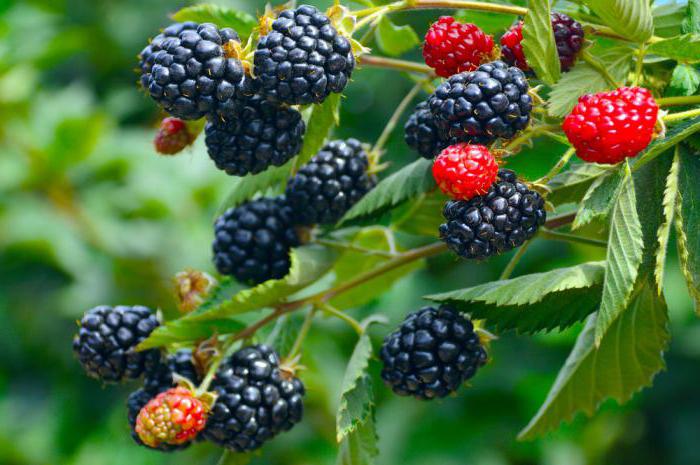

Berries quench thirst, reduce fever and have a diaphoretic effect. Therefore, they are extremely valuable in the fight against infections and pneumonia.
Tea with the addition of blackberries has a tonic effect, soothes and strengthens the nerves. It also has a positive effect on the intestines. At the same time, both mature and green berries help: the former stimulate the work of the organ, and the latter cope with diarrhea and disinfect.
Health benefits of blackberries
First of all the benefits of blackberries lie in their berrieswhich retain their medicinal properties both in dried and frozen form. Eating them in food, you can normalize metabolism, body functions, strengthen immunity, slow down the aging process in the body.
The substances contained in berries even have a preventive effect in the field of cancer. The effect is achieved due to polyphenolic compounds, which are similar in their action to antioxidants - they protect the body from free radicals.
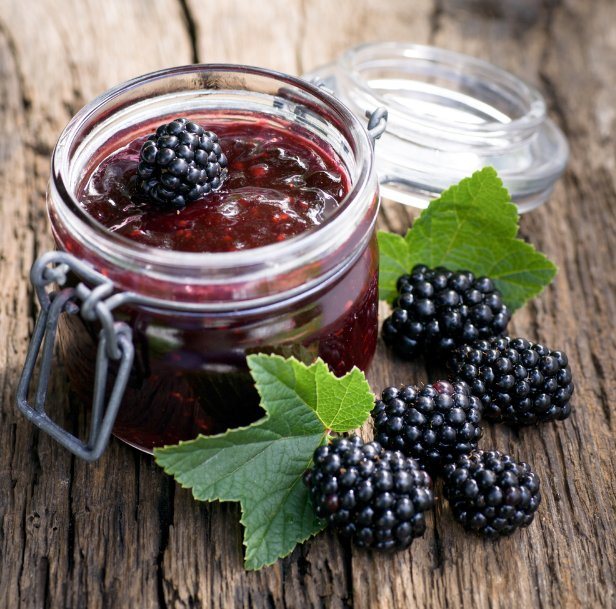

What else is blackberry good for? This has been known since ancient times antipyretic and anti-inflammatory agent. The main active ingredients in this case are flavones, which work together with salicylic acid, a well-known natural aspirin.
The catechins, which are part of the flavonoids, ensure the absorption of cholesterol, the utilization of heavy metals, the destruction of harmful bacteria, and a decrease in blood sugar levels.
Outwardly fresh leaves apply for the treatment of various skin diseases. To do this, they are crushed into gruel and applied to areas affected by lichen, eczema, trophic ulcers, bruises, wounds, abscesses.
Did you know? The plant is known for the fact that, in addition to berries, the leaves and roots of blackberries have medicinal properties. They are also harvested and used raw for various therapeutic and prophylactic purposes.
Contraindications and possible harm
Has a blackberry useful properties and contraindications. It is not recommended for those patients who have an increased acidity of the stomach. The components contained in berries can lead to the development of gastritis. Medicines based on this plant are prohibited for people suffering from low blood pressure. Decoctions and infusions greatly reduce blood pressure, which may cause the patient's condition to worsen.
You need to know the benefits and harm to the body of blackberries so as not to harm your health. In addition to nutrients, it also contains allergens, such as salicylates. If a person cannot tolerate aspirin, they may develop an allergic reaction after consuming the fruit. It manifests itself in the following symptoms:
- tearing;
- tingling of the skin of the face;
- rash;
- itchy skin.
Most often, allergies are mild and go away quickly on their own. In severe cases, it is necessary to take antihistamines, otherwise anaphylactic shock may develop. There are a lot of tannins in the blackberry root, therefore, funds based on it cannot be taken by patients with colitis, chronic cystitis and urolithiasis. Drinking a lot of blackberry leaf tea can increase your body's tannin levels. This provokes the appearance of nausea and vomiting.
The main contraindications to the use of blackberries:
- kidney disease;
- individual intolerance;
- increased gastric acidity;
- severe form of diabetes mellitus.
Funds based on this plant are prohibited for children under 2 years of age. For older children and elderly people, drugs are prepared at a low concentration.
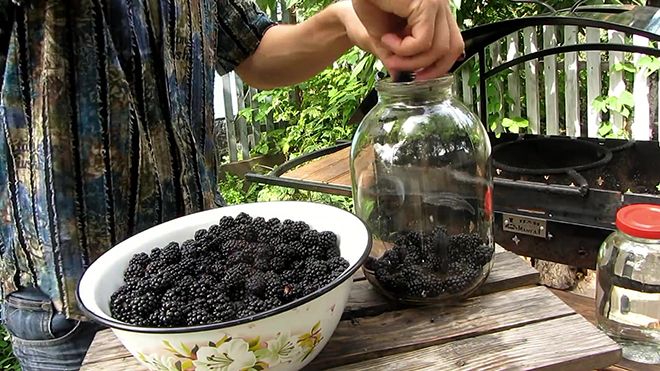

Useful properties of blackberry leaves
Blackberry leaves are rich myritillin - a substance often called "natural insulin". Its highest concentration is observed in the leaves before the berries ripen. Therefore, the leaves for the broth are collected ahead of time from young plants. A decoction of them lowers blood sugar levels.
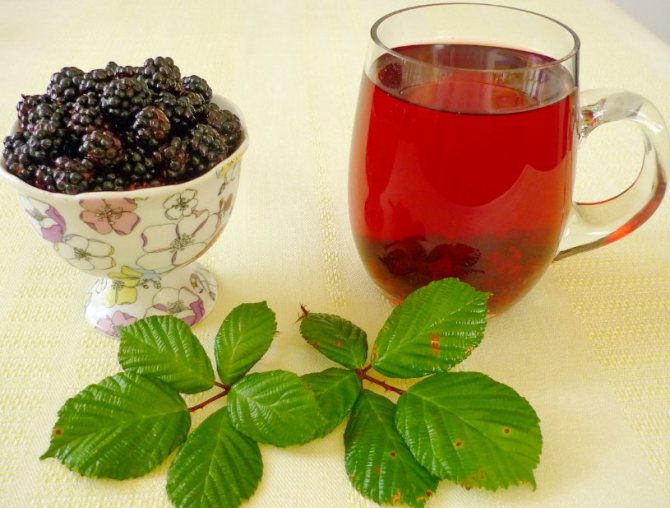

Blackberry broth and tea are also taken to treat gastritis, dysentery, poor digestion, duodenal ulcers and stomach ulcers. It has a good effect with all kinds of bleeding: uterine, heavy menstrual, pulmonary, gastrointestinal.
Such a drink helps with the occurrence of adhesions after operations, has a diaphoretic and diuretic effect, relieves inflammation in the upper respiratory tract.
Important! Blackberry juice is prepared from young leaves and ripe berries of the plant, which is drunk in combination with the treatment of all the above diseases.
For stomatitis and other gum diseases, they prepare infusion of leaves for rinsing. For this, 4 tbsp. l of chopped blackberry leaf is poured with 2 cups of boiling water and insisted for half an hour.
If you prepare a decoction not only from the leaves, but also from the branches of a plant, it helps well with neuroses of the heart, menopause and other neuroses, and generally strengthens the nervous system.
Folk broth
It is used as a diaphoretic and effective diuretic. Prepared in a ratio of 1 to 10. Provides assistance with gastric bleeding and dyspeptic disorders, skin rashes. For this, the gruel from the leaves is applied in the form of a compress. This is how eczema, lichen and purulent boils are removed.
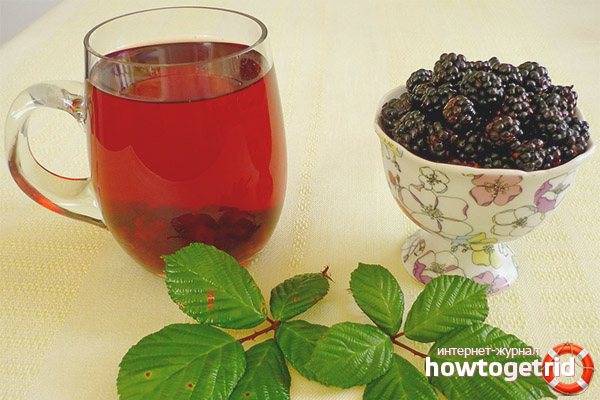

- From cough.
To prepare a cough drink, you must take an equal amount of dried blackberry, coltsfoot, linden and raspberry leaves. Brew in the usual way. For more benefits, you can add natural honey. Such an infusion will help to separate phlegm, relieve coughing, and sweat. - For hair improvement.
If you wash your hair with a decoction at least 2 times a week, it will accelerate hair growth and give it thickness. - With upset stomach.
Collection of mint leaves, blackberries, chamomile and raspberry inflorescences will help. Everything is taken in equal portions and brewed. No more than 2 small spoons of the mixture are placed on the glass. Insist for 10 minutes. - With bleeding (hemorrhoids, stomach).
For 200 ml of water, approximately 10 g is taken. young shoots and leaves. All this needs to be brewed. - For sore throat and gums.
It is helpful to infuse mouth and throat rinses, or use it as a daily gargle. - Infusion for nervous disorders (can be used with menopause).
Pour 0.5 liters of two tablespoons of dried leaves. boiled water. Cover tightly with a lid and leave for 6-7 hours. Then strain through a sieve and refrigerate. Apply 1⁄4 cup, 4 times a day. Continue treatment until all symptoms of nervous exhaustion disappear completely. - Infusion to strengthen the body's defenses and increase immunity.
One tablespoon of carefully dried leaves just need to be poured with a mug of boiling water. Then cover tightly and let it brew for 20 minutes. Divide the prepared infusion into 3 parts. Take one at a time, 3 times a day. - A remedy for poisoning and inflammation.
Pour one tablespoon of dry and crushed leaves into a thermos. Pour 200 ml of boiling water there. Let it brew for 3-4 hours. Strain the infusion from suspensions. Keep refrigerated. Take 3 times a day, 100 grams. before meals. Treatment is carried out before the inflammatory process is removed. It usually takes 10 days. - Fresh leaves are widely used in cosmetology.
From the greens of "black raspberries" are advised to make masks for hair growth and strengthening the roots. Balms fight oily scalp. A decoction of the leaves brightens the skin of the face.
How blackberry root is used in folk medicine
Medicinal properties have been known since ancient times blackberry root, which is also widely used in traditional medicine. His decoction used for dropsy as a carminative, with ascites to remove fluid.
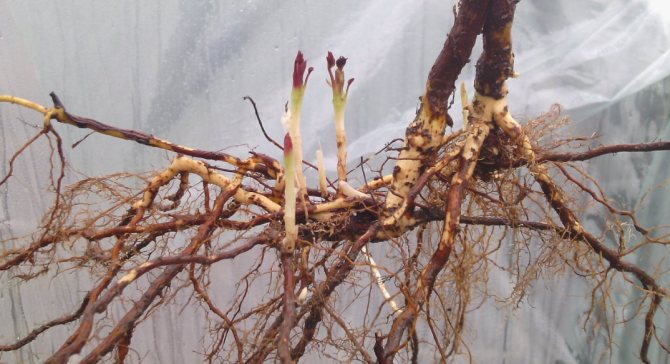

A decoction of blackberry root has proven itself well in the treatment of pharyngitis, tonsillitis and tonsillitis. To prepare it take 20 g of chopped rhizomes and boil in a glass of water for about 20 minutes. The broth must be infused for 3 hours and filtered.
Did you know? Blackberries, thanks to the catechins they contain, help to improve metabolism and fight overweight, even obesity. It prevents the body from accumulating incoming excess fats, while increasing energy consumption, due to which the previously accumulated ones are used. In addition, berries help cleanse the body. Moreover, even frozen blackberries help to remove slags and other deposits.
Blackberry tea
The drink saturates the body with all the richness of vitamins and microelements that are found in the berry. It will soothe in case of nervous strain and stress.To make tea with berries, they are washed, the tea leaves are poured into the teapot and one third of the boiling water is poured. After waiting a few minutes, add the rest of the liquid and add sugar to taste.
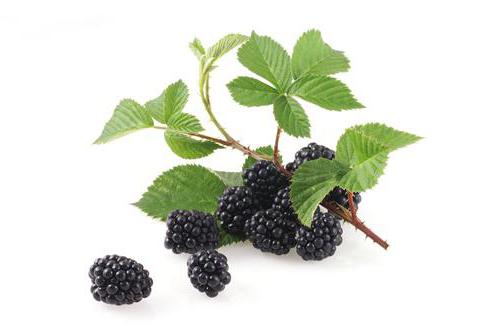

For cooking, you will need the following ingredients:
- a small spoonful of large leaf tea;
- two small spoons of berries;
- glass of water;
- sugar optional.
Berry juice is very useful. For this, the most ripe of them are chosen. It will help with hoarseness if the vocal cords are not working well. Then a glass of warm juice is drunk in small sips.
Harvesting of medicinal raw materials from blackberries
Any part of the plant is useful, but each must be harvested according to its own rules. So, berries harvested only at full maturity. It was at this time that they are maximally rich in nutrients.
They can be used fresh, prepared in the form of preserves, juices, jams.
The berry retains most of its beneficial properties even after freezing or drying. In the latter case, it is recommended to use artificial heat. Whichever way you prepare the berries, they retain their useful properties for no more than 2 years.
Blackberry root harvested in late autumn. It is dug up, washed from the ground, damaged or dried out parts are cut out, dried in the open air, but not in direct sunlight. Then the roots are wrapped in natural cloth or paper and stored in a dry, cool, dark place.
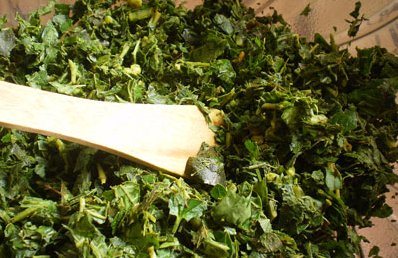

Leaves they are removed from the bush throughout the season, but they are considered the most valuable young, fully formed leaves, removed before the berries ripen on the bush
... They are dried in ovens immediately after harvest at temperatures up to 40 ° C.
When preparing leaves for blackberry tea, they are subjected to fermentation. After collecting, lightly press with a wooden rolling pin on a wooden board until they let the juice out. Then fold it tightly into a saucepan and close a lid under a press. Within 2-3 days, the mass should turn black. As soon as this has happened, it is immediately sent to dry.
Features of the use of blackberries
No matter how useful this berry is, it has some contraindications:
- an allergic reaction is possible, mainly to a decoction of blackberry leaves. Berries rarely cause such a reaction;
- if you have diseases of the small intestine and stomach, replace fresh berries with blackberry juice;
- with increased acidity of the stomach, limit the daily intake of blackberry juice to one glass.
In most cases, blackberries are not only a great dessert, but also a good natural remedy.
In folk medicine
For a long time, blackberry leaves have been used as an effective remedy in the treatment of diarrhea and dysentery. This is due to the abundance of astringent tannins in them, which help control the functioning of the digestive tract. In folk medicine, all parts of the plant are used. Recipes have long been known:
- a decoction of leaves for diabetics;
- infusion for irritability and insomnia;
- compress from wounds, swellings, trophic wounds and inflammations;
- powder for diarrhea;
- diuretic broth;
- tincture for influenza and bronchitis.
Leaf decoction
Do not think that the power of blackberries lies only in berries. Leaves are no less useful. They are known for their astringent, wound healing and diaphoretic properties. Such a wide spectrum of action is successfully used in a decoction for the treatment of dysentery, diarrhea, bleeding, ulcers, eczema, and purulent wounds.
However, be careful! Consuming a large amount of this broth significantly increases the concentration of tannins in the body and in some cases causes complications such as vomiting. In this case, doctors usually advise drinking milk. It neutralizes the effect of tannins. Such a decoction is contraindicated for people with oncology or with a history of this disease.
Root-based decoction
With an exacerbation of chronic pyelonephritis, you can take a decoction based on the root of this plant. Add 300 ml of boiling water to three tablespoons of chopped blackberry root. A broth is prepared over low heat for 10-15 minutes. Then they cool, filter. The recommended dose is a tablespoon every two hours in case of exacerbation of the disease.
Caution! Blackberry root is a rich source of tannins and is not recommended for chronic gastrointestinal conditions such as colitis.
Tincture
Blackberry vodka tincture is known as a remedy for the flu and colds. Prepare a tincture at the rate of 60 grams of fresh blackberries per glass of vodka. The agent is placed in a cool dry place for three days and taken twenty to thirty drops three times a day when symptoms of the disease appear.
Dried Berry Powder
Dried blackberry powder is indicated for diarrhea. Half a teaspoon of powdered dried berries is taken three times a day with plenty of water. Symptoms disappear within five to seven days. This remedy is safe even for children over three years old.
Compress
Fresh blackberry leaves can be applied to the legs for several hours for varicose veins or chronic ulcers. This compress will have a regenerating effect and relieve pain. The compress is applied for 15 minutes twice a day.
In cosmetology
In addition to the health benefits listed above, blackberries can serve as a delicious help for people to maintain radiant, beautiful skin. Consuming blackberries can promote healthy natural tissue tightening, which is a wonderful non-surgical procedure that makes skin look younger. In cosmetology, those parts of the blackberry are used that help moisturize the skin, get rid of the gray shade, cleanse and restore the radiance of the skin. Also, blackberry extract is used to eliminate dermatological skin problems. Combined with a variety of ingredients, blackberries can be used in all types of skin care.
Blackberry masks for face skin
Maintaining hydration is essential for radiant, healthy skin. It is recommended to regularly consume blackberries to detoxify your own body and maintain skin elasticity, as well as to keep it hydrated from the inside out. Alternatively, you can make a face mask by mixing blackberry juice with a teaspoon of honey. The mixture is applied in thin layers to the face and neck. Then it is washed off with warm water. This way, you can moisturize your skin while providing it with the nutrients it needs.
Due to the high amount of vitamins A, C and K, blackberries have skin rejuvenating properties. Omega-3 and omega-6 fatty acids also contribute to this. Just make a face mask: mix crushed berries with fresh yogurt, a pinch of nutmeg and lemon juice. Apply this mask all over your face and neck for half an hour. Regular application of the face mask will rejuvenate and provide smooth and hydrated skin.
In cooking
Blackberries can be added to fresh fruit salads, baked goods such as cakes and pies. Can also be used for making jelly or canned food. Blackberries can be paired with other fruits to make fruit salsa and served with chips. Blackberries make a delicious addition to a variety of desserts, including ice cream. This berry is used in the preparation of wines. Available in canned and dried form. Very good and healthy fresh.
The benefits of blackberries during pregnancy and breastfeeding
What blackberries are good for women are styptic and soothing properties. But not always a woman can use for food everything that she needs or wants.
The same rule applies to blackberries.On the one hand, its rich composition should help a woman during pregnancy and lactation. On the other hand, it is fraught with many dangers, in particular dangerous allergic reactions to the berry.
Therefore, the question of whether it is possible for pregnant women to have blackberries is difficult to answer unequivocally. If a woman does not have allergic reactions to her, intestinal disorders, cystitis, pain or heaviness in the kidneys, then the berry can be safely consumed.
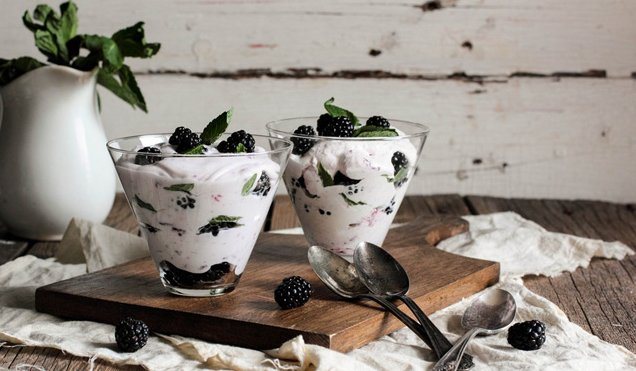

If at least one symptom from this list appears, you must immediately abandon it and consult a doctor. As for nursing mothers, in this case, another rule applies - you can eat blackberries only after the child is 3 months old.
The rest of the plant has a beneficial effect on the body of a nursing and pregnant woman. The entire set of vitamins, micro- and macroelements contributes to the normalization of metabolism, an increase in hemoglobin levels, and wound healing.
A decoction of blackberry leaves during pregnancy helps to eliminate inflammation, congestion in the body and, in general, to restore the body after childbirth.
Important! In addition, blackberries have a great effect on the skin of the face. The use of masks from the berries and leaves of the plant helps to get rid of the earthy skin tone, restore its freshness, and remove the layer of dead cells.
Blackberries and beekeeping
Blackberries are considered to be an excellent honey plant. Up to 40 kg of honey can be removed from one hectare of plant. The first flowers appear on the shrub in June, and the last bloom in September. Each flower is very rich in nectar, which is why bees love blackberries.
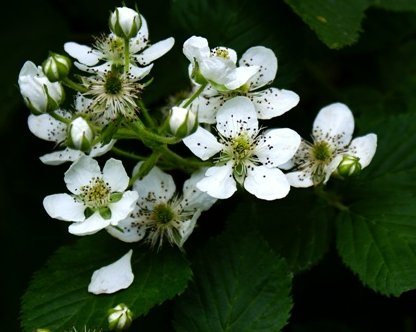

It turns out transparent, light, honey sometimes with a slightly yellowish tint.
Unfortunately, the berry is rarely cultivated, mostly grows wild, but specially planted plantations give yields for ten years.

